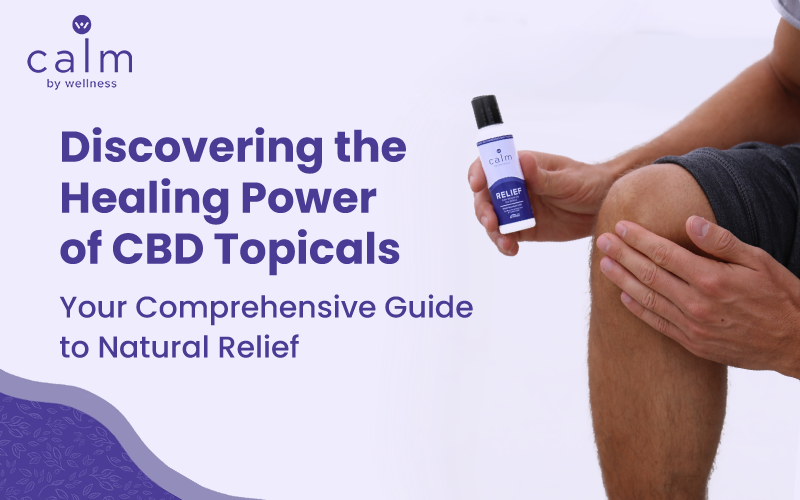CBD for Athletes: The Ultimate Guide to Faster Recovery & Peak Performance
Training, competing, and pushing your limits are part of the athlete’s lifestyle, but so are sore muscles, tight joints, and days when your body begs

Cannabidiol (CBD) has become a popular wellness trend. From calming oils and sleep-inducing gummies to convenient capsules, it seems CBD has infiltrated every corner of the health and wellness market. But the latest frontier for this cannabis compound is a surprising one: topicals. Lotions, creams, balms, and even bath bombs infused with CBD are lining store shelves, sparking curiosity (and sometimes skepticism) among consumers.
So, what exactly is CBD doing in your moisturizer, and does it offer any real benefits for your skin? More importantly, with CBD topicals often carrying a premium price tag, is the hype worth the investment? Read on for more.
The two leading causes of skin aging and common skin issues like acne and hyperpigmentation are:
Our skin maintains a complex equilibrium through a network of cell receptors called the endocannabinoid system. This system plays a role in regulating functions like oil production and pigmentation, but scientists are still unraveling its full range of influence.
Here’s where CBD enters the picture. Cannabidiol, a compound found in cannabis, has gained interest for its potential health benefits. Early research suggests CBD might interact with the endocannabinoid system, and some studies have explored its effects on inflammation and antioxidant activity.
While research on CBD is still evolving, some early findings paint an intriguing picture. Let’s explore how CBD’s potential antioxidant and anti-inflammatory properties might interact with the skin, our body’s largest organ:
CBD-infused skincare products are taking the beauty world by storm, lining shelves and gracing websites. With so many options available, you might wonder how to incorporate CBD into your routine. CBD creams and other topical products offer a unique way to explore the potential benefits of CBD for your skin. Let’s explore some application methods to help you navigate the world of CBD topicals.
The world of CBD skincare is brimming with options, from lip oils to daily moisturizers. But with so many choices, finding high-quality products can feel like a challenge. Let’s explore some key considerations to help you navigate the CBD skincare aisle:
According to several studies, applying CBD topically may provide potential therapeutic relief for people with inflammation and pain. While these early findings are encouraging, more studies are required to confirm the long-term efficacy and ideal applications of CBD topicals for specific skin concerns.
Keep in mind that the effects of topical CBD products can vary depending on the individual and the specific product. While some users report feeling the effects within 20 minutes, it could take longer. Similarly, the duration of these effects may range up to 3 hours. Cannabis, unlike some other delivery methods for CBD (like oils or edibles), has a limited effect on the absorption of cannabinoids through the skin. This localized effect can be a benefit for those seeking targeted relief on the area of application.
Unlike ingestible or inhaled CBD, topical applications are generally not designed to enter the bloodstream in significant amounts. This localized effect allows for targeted pain relief in the applied area, but may not be as effective for addressing widespread pain. Therefore, CBD topicals are often considered suitable for managing discomfort in specific areas, rather than addressing whole-body needs.
Training, competing, and pushing your limits are part of the athlete’s lifestyle, but so are sore muscles, tight joints, and days when your body begs
The 4th of July is more than fireworks and barbecues — it’s a chance to pause, connect with family, and embrace activities that leave you
Fireworks, BBQs, and parades — there’s a lot to love about the Fourth of July. But if you’re wondering how to keep your pets calm

In an era where anxiety disorders affect hundreds of millions worldwide, there’s growing interest in non-traditional solutions. AI for Mental Health + CBD is quickly

Struggling to fall asleep at night? You’re definitely not alone. Nearly 70 million Americans face sleep issues regularly. But what if a natural remedy like

Calm by Wellness is the most recommended CBD & Delta-8 oil in the world. Trust our verified 5 star reviews and testimonials. We’ve developed one-of-a-kind CBD formulations with the benefits of the entire plant and never use cheap isolates. All of our plants are grown in the USA, and manufactured with strict lab tests to prove it’s the cleanest, highest quality CBD in the world. Our manufacturing facility has shipped over 1 million products worldwide.
Calm by Wellness
609 Deep Valley Dr. Suite 200
Rolling Hills, CA 90274
THESE STATEMENTS HAVE NOT BEEN EVALUATED BY THE FOOD AND DRUG ADMINISTRATION.
THIS PRODUCT IS NOT INTENDED TO DIAGNOSE, TREAT, CURE, OR PREVENT ANY DISEASE.

Calm by Wellness is the most recommended hemp CBD oil in the world. Trust our verified 5 star reviews and testimonials. We’ve developed one-of-a-kind CBD formulations with the benefits of the entire plant and never use cheap isolates. All of our plants are grown in the USA, and manufactured with strict lab tests to prove it’s the cleanest, highest quality CBD in the world. Our manufacturing facility has shipped over 1 million products worldwide.
Calm by Wellness
609 Deep Valley Dr. Suite 200
Rolling Hills, CA 90274
[email protected]
THESE STATEMENTS HAVE NOT BEEN EVALUATED BY THE FOOD AND DRUG ADMINISTRATION.
THIS PRODUCT IS NOT INTENDED TO DIAGNOSE, TREAT, CURE, OR PREVENT ANY DISEASE.